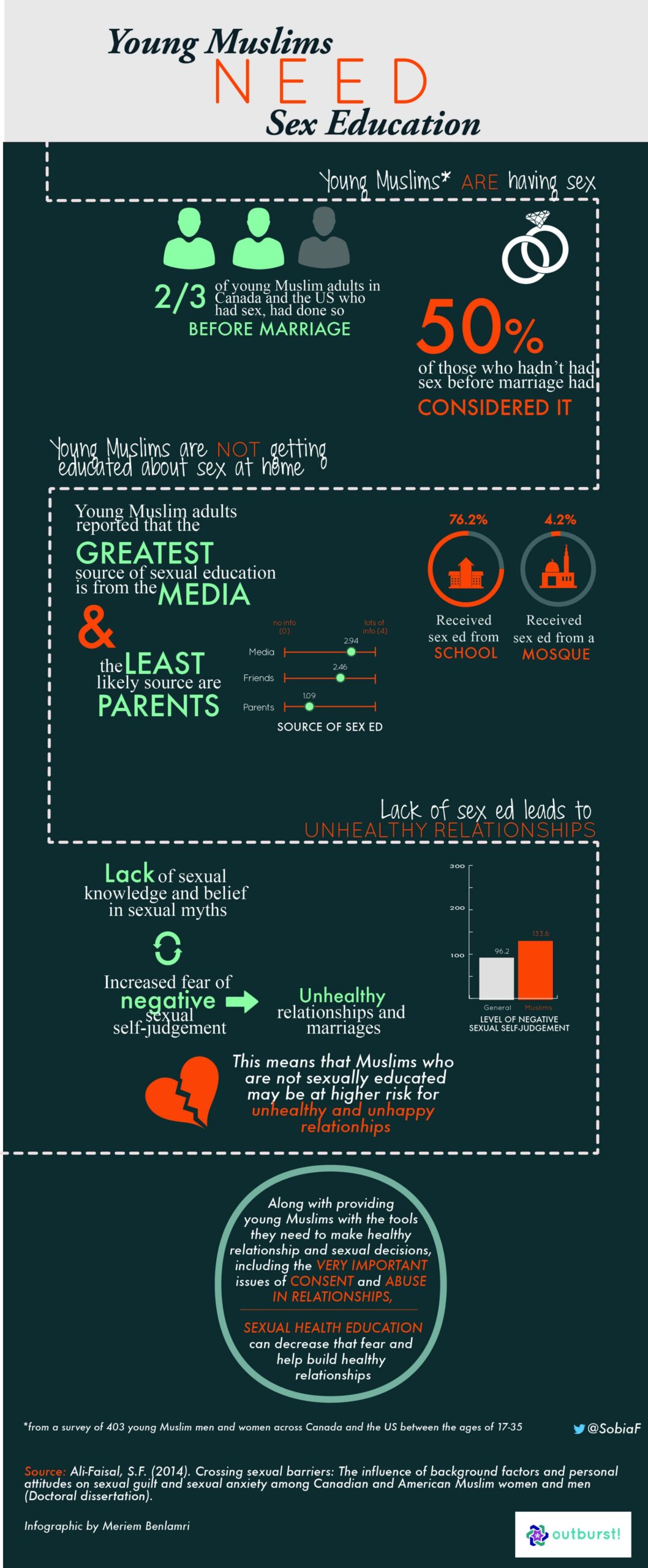originally published on http://www.patheos.com/blogs/heartfelt/
by Nadiah Mohajir
When thinking about Islamic values around sex and sexuality, two that are often emphasized are modesty and privacy. We are encouraged in Islam to embody modesty – both with respect to external appearance as well as our thoughts, behavior and interactions with others – and we are encouraged to be private about our bodies and our sexuality. Intimacy and sex are seen as enjoyable, but sacred experiences between two people, most often in the context of marriage.
While modesty and privacy are excellent values to honor and uphold, historically, faith communities haven’t done a very good job. More often than not, in efforts to uphold privacy and modesty, communities actually instill shame and promote silence around these issues. Specifically, speaking openly about these issues – especially but not only if – you are not married, is deemed immodest and no longer private. Yet, associating these feelings of shame with sexual health is actually more damaging than beneficial -whether you are a young adolescent girl or boy navigating the many physical and emotional changes of puberty or an adult navigating relationships and sex.
The best example to demonstrate this distinction is to compare menstruation – a natural, monthly, bodily process that most women and girls experience after they reach puberty – to urination and defecation, a natural, daily, bodily process that ALL people experience. We have guidelines in using the bathroom – we close the door, we practice a certain level of privacy and modesty with respect to using the bathroom. For example, we don’t speak about using the bathroom graphically, or at the dinner table.
There is a stigma and shame associated with menstruation that is not comparable to the other bodily functions. Specifically in the Muslim community, this shame and stigma leads many young girls to hide the fact that they are menstruating from the men in their lives, sometimes even being encouraged (or expected) to “fake” pray and “fake” fast, despite being lawfully excused from observing those rituals. For example, a 12 year old who may have her period in Ramadan may be asked by her mother to continue waking up for the pre-dawn meal to eat and to pretend to join in morning prayer as to avoid her father and brothers from knowing she’s on her period. Similarly, a young mother on her period may lie to her son about why she didn’t pray, rather than just being honest. The result of this approach is two-fold. First, we are more likely to lie than just be straightforward by saying, “I’m excused from praying and fasting today,” out of fear that our male relatives will feel uncomfortable. Second, we are teaching our daughters a sense of shame and our sons ignorance towards something that should be approached as a natural part of life for females.
Yet, this same shame does not exist with other bodily processes such as urination and defecation. So why the shame with menstruation, which also, is just as natural a bodily process as having to use the bathroom?
Before we can talk about how to begin working toward eliminating shame and normalizing conversations on our bodies, reproductive processes, and sex, let’s first understand why using a shame-based approach to speak about puberty and sex is so problematic.
Shame is different than guilt. Guilt can be a healthy emotion, as it makes one feel bad about something they did, whereas shame is unhealthy: shame means you feel bad about who you are, that you are blameworthy for what is happening. The definition of shame is “a painful feeling of humiliation or distress caused by the consciousness of wrong or foolish behavior.” The very definition of shame involves being aware of “wrong or foolish” behavior, when in reality, puberty, menstruation, and sex are all natural, bodily processes and desires, and not something anyone should be blamed for experiencing.
Shame leads to silence, and not reaching out when you need help or have questions. Often times, when girls or women reach out to me about a reproductive health issue they have been struggling with for a while, I’ve asked them why they hesitated initially from reaching out to a trusted adult or professional for help. Their response, almost always, is that they felt ashamed to be struggling with the issue and therefore decided to keep it to themselves.
Shame makes you feel paralyzed and not move forward. Shame is the very emotion that impedes one from dealing with the issue at hand. For example, many survivors of sexual assault are paralyzed by the shame they feel and unable to seek help from professionals trained to serve them. A woman struggling to consummate her marriage due to a easily treatable condition called vaginismus may hesitate to seek professional help because of the shame she feels when talking about sex.
Shame leads to feeling unworthy, less than another. Those who experience shame typically embody lower self-esteem and are less confident, and feel that they are less worthy than others. Moreover, they are more likely to tie that self-worth to certain milestones, like being successful professionally or getting married.
So how can we begin eliminating shame from the discussion while still honoring our faith values of modesty and privacy?
1) Use correct anatomical terms when talking to children about their bodies. There are many who come from faith-based or cultural communities that do not have a tradition of using correct anatomical terms for private parts. Rather, families refer to the general area or use code words to refer to those body parts. This is problematic because it inherently instills shame: the message that children are getting is that it is immodest or shameful to use correct anatomical terms. Using correct terminology in conversation not only normalizes these terms, but also equips your child with the correct language and tools they may need to communicate with you or their doctor should they be experiencing a problem.
2) Commit to having ongoing conversations about puberty and sex with children. Using a developmental approach to talking about sex can be beneficial in building a foundation for an important life skill. When children attend school, they learn academic subjects like Math, Science, and English, and as they grow older, the concepts build off each other and get more complicated, which ultimately provides them with a comprehensive understanding of the subject. In the same way, repeated, age-appropriate conversations about puberty and sex are crucial to give them the information and skills they need to fully process the big picture and figure out how they fit into it.
3) Create safe spaces and an open door policy. Children should feel safe to ask any question they may have about their bodies and sex, without being shamed or reprimanded for thinking about such things. If you create a loving, open and safe space for them early on, they will continue to come to you as they get older and begin navigating more complicated and nuanced situations.
4) Validate and affirm what your child may be feeling. Simple statements such as “it is normal and not surprising that you have this question” or “you’re doing the responsible thing by speaking with someone, and know you are not alone. Most kids your age have similar questions” can seem like insignificant gestures on your part, but are incredibly important for a teen trying to make sense of the many social emotional and physical changes they are experiencing.
5) Encourage father-daughter and mother-son conversations. Historically, conversations about puberty and sex are gender segregated: mothers speak to their daughters, and fathers speak to their sons. While sex may be an uncomfortable topic for dads to broach with their daughters, or mothers to broach with their sons, it is crucial now more than ever for dads and moms to engage in candid, two-way conversations about sex with all their children as a way of modeling healthy communication about sensitive topics as well as encouraging safe, and healthy relationships. Perhaps a father may not feel comfortable starting a face-to-face conversation, but would be open to journal writing with his daughter, as a way to open up the lines of communication.
As the world continues to become increasingly hypersexualized, it is crucial that we work with our children to avoid mixed messaging so that we can ultimately instill positive attitudes toward reproductive and sexual health issues. Puberty and sex are natural, healthy aspects of everyone’s lives and historically, Islamic tradition has approached them as just that. Yet, our cultural expectations and mixed messaging have led to lacing these issues with much shame and stigma. It is time we reclaim our values for what they were always meant to be: tools of empowerment to facilitate healthy sexual lives and families.
Share with us: What have you found helpful in speaking to your kids about puberty and sex? How do you work to instill a healthy attitude toward sex and our bodies?


 Later that evening, HEART facilitators Nadiah Mohajir and Sameera Qureshi, who flew in from Calgary, Canada, trained over thirty Muslim college women at Tufts University. A collaborative event between Tufts, Harvard and MIT, the workshop focused on facilitating a discussion that explored the sexual and reproductive needs of Muslim women and girls, the barriers to feeling emotionally and culturally safe when seeking and processing sexual health information, and strategies that we can all start employing to create safer communities.
Later that evening, HEART facilitators Nadiah Mohajir and Sameera Qureshi, who flew in from Calgary, Canada, trained over thirty Muslim college women at Tufts University. A collaborative event between Tufts, Harvard and MIT, the workshop focused on facilitating a discussion that explored the sexual and reproductive needs of Muslim women and girls, the barriers to feeling emotionally and culturally safe when seeking and processing sexual health information, and strategies that we can all start employing to create safer communities.